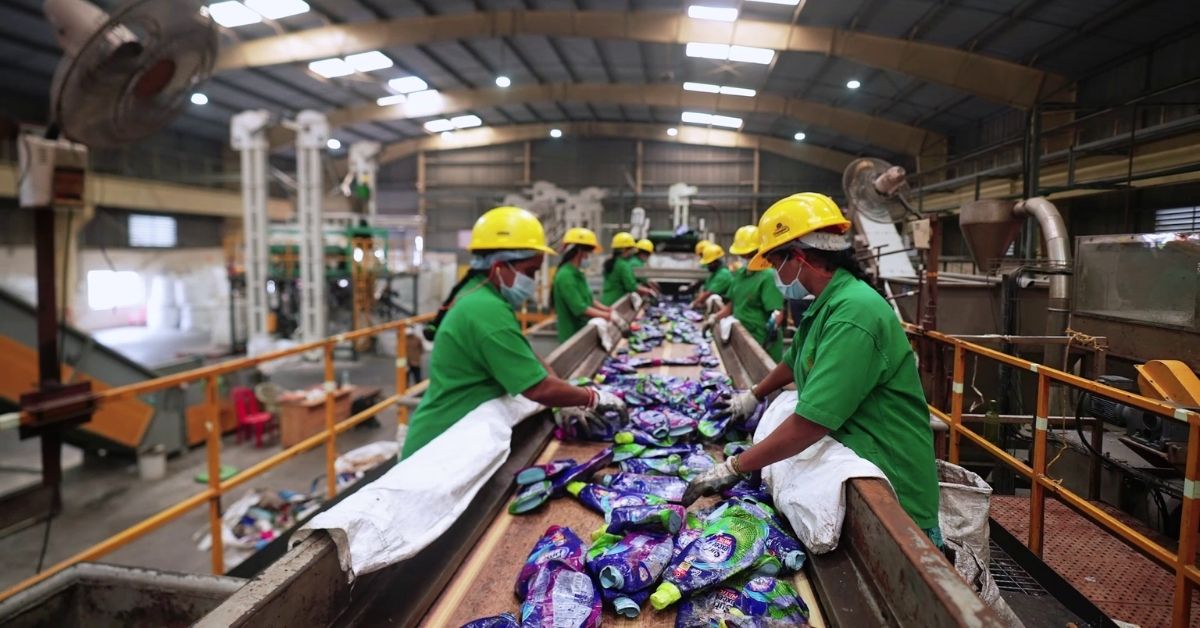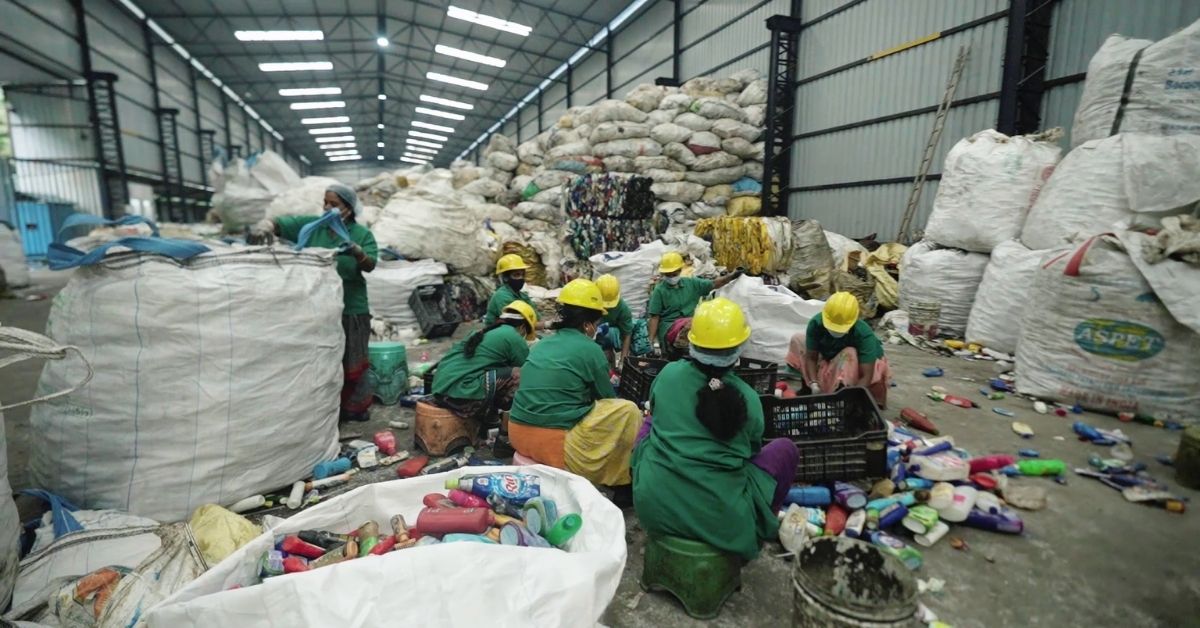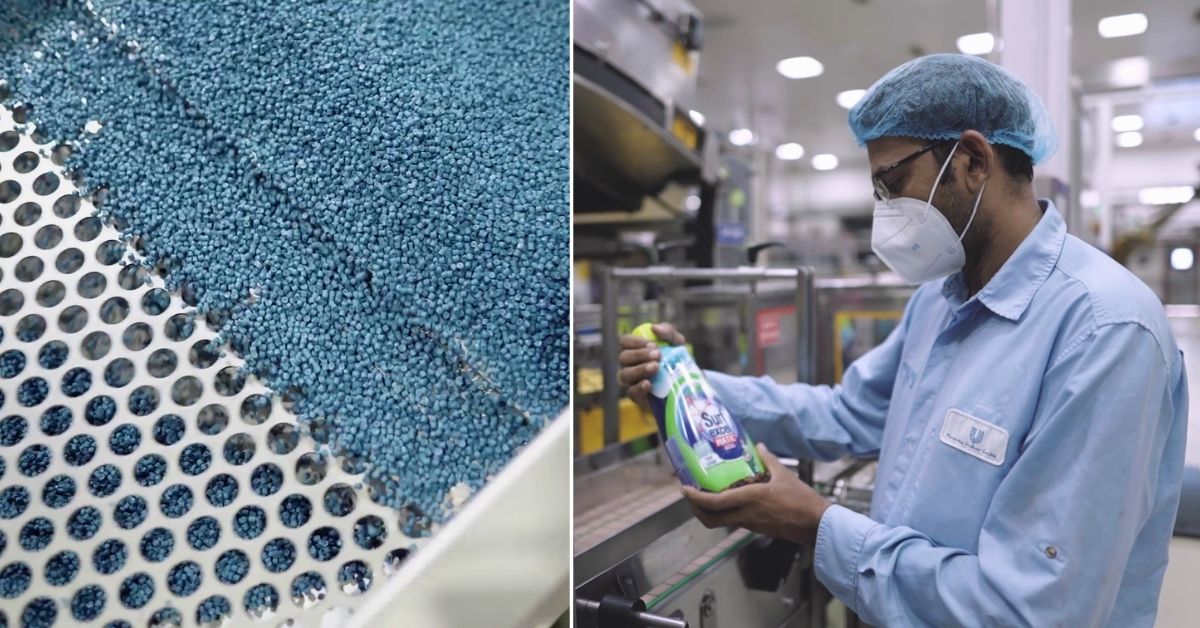This article has been sponsored by Surf Excel
In a recent report, the Ministry of Environment, Forest and Climate Change stated that India generated more than 3.4 million metric tonnes of plastic waste in 2019-20. As alarming as it may sound, the plastic problem is not an impossible one to solve.
The problem has inspired two youngsters, Rajkiran Madangopal and Mani Vajipey, to find a sustainable solution. Their joint efforts eventually led to the foundation of Banyan Nation — one of India’s first vertically integrated plastic recycling companies that enables big global brands to use more recycled plastic instead of virgin plastic.
Old Plastic, New Solution

From the Silicon Valley to the back alleys of Hyderabad, Mani and Rajkiran have spent the last eight years building a technology that converts post-consumer plastic waste into high-quality recycled granules. These recycled plastic granules, comparable by both quality and durability, can be used to create a variety of packaging materials, as an alternative to virgin plastic.
“Recycling activities in India are driven by market forces that are informal and largely invisible. Millions of rag pickers today scavenge the street corner bins and the landfills, collecting valuable materials. They then sell to the kabadiwalas, who then sell to the back-end aggregators, who finally sell it to the recyclers,” explains Mani in this video.
The need of the hour is to have a formal recycling system, which ensures a superior quality of the recycled materials and checks the ability to recycle a plastic material that has already entered the system more than once.
As a solution, Banyan Nation’s award-winning data intelligence platform integrates thousands of these informal recyclers on their singular supply chain, thus streamlining the process and enabling cities to manage waste efficiently. The application maps over 1,500 stationary recyclers and provides a bird’s-eye view into the journey of waste — from generation to recycling.
Recycling The Recycled

Today, with the data-driven application and the technology to create world-class recycled plastic granules, they are collaborating with a number of global brands changing the way we perceive and consume plastic.
Recognising their potential of creating a massive impact, Hindustan Unilever (HUL) became one of the top brands to collaborate with the Banyan Nation in 2018.
Sustainability is at the heart of HUL, and their association with Banyan Nation to revolutionise their packaging design is a strong step towards achieving that goal. Under this partnership, Banyan Nation worked to innovate and create packaging bottles using recycled plastic to cut down the net plastic generated.
“With respect to product and packaging design, we have always focused on creating efficient and sustainable alternatives that ensure they don’t end up polluting the water bodies or landfills. We are committed to help collect and process more plastic packaging than we sell by 2025 and increase the use of post-consumer recycled plastic material in our packaging. That was the guiding principle while designing the recyclable packaging for one of our top selling products — Surf Excel Matic Liquid,” says Prabha Narasimhan, HUL’s Executive Director, emphasising on the need to focus on a clean future.
However, creating sustainable packaging, especially for a liquid detergent, was not an easy task.
After two and a half years of relentless research and development, Banyan Nation and HUL were finally able to create high-quality recycled granules (PCR).
Thanks to this innovation, since August 2019, HUL’s Surf Excel has transitioned to using 50 per cent recycled plastic in their bottles, while ensuring no compromise in terms of quality and durability in packaging.
“Usually, there is a lot of scepticism around the safety and quality of products and packaging made from recycled plastics. What we don’t realise is that plastic can be recycled many times over. The HDPE (high density polyethylene) plastic bottles that most of us use in our homes, if recycled scientifically, can be made into new bottles again. With Banyan Nation’s conscientious recycling process and HUL’s quality initiatives, we are able to recover, recycle and reproduce the bottles several times without any compromise in quality. Through our unique partnership, we are beginning to turn an exhaustible and polluting resource like plastic into a “renewable” one,” says Mani Vajipey, CEO and Cofounder, Banyan Nation.
The Process

In a number of FMCG companies, the use of virgin plastic—which is extractive in nature—is prominent but Unilever is setting an alternative positive example for these companies by ensuring it’s packaging uses recycled plastic. They are able to accomplish this feat with the help of Banyan Nation
“We source bottle-grade plastic from the informal scrap markets and thoroughly wash it, followed by shredding and grinding of the plastic. This is then washed again in hot water and made into PCR pellets, which is essentially recycled plastic. This recycled plastic is then sent to convertors, who blend it with virgin resin and blow air into it to create the bottles. The proportion of mixing virgin resin and recycled resin varies from one company to another. And, the company through its relentless efforts in the last two years has been able to create Surf Excel bottles that have replaced the use of virgin resin with recycled plastic by 50 per cent,” says Rajkiran Madangopal, co-founder of Banyan Nation.
The company sells about 18 to 20 lakh bottles of Surf Excel Matic Liquid every month and has been conducting clean-up and plastic collection drives to keep the sustainable cycle rolling.
As of now, Banyan Nation has helped HUL recover and recycle more than 1,000 tonnes of plastic waste into packaging by manufacturing over 100 million bottles. Additionally, Banyan Nation, since its inception in 2013, has recovered 3,000 tonnes of bottle-grade plastic waste from the environment to change them into packaging.
Aided by this promising feat, HUL aims to reduce their plastic footprint by 50 per cent at least by eliminating 1,00,000 tonnes of plastic and move to using at least 25 per cent recycled plastic by 2025. In the future, they also hope to expand their setup of no plastic innovations like the refill machine setup in a Mumbai store.
Marking World Clean Up Day on 18 September 2021, Willem Uijen, Executive Director Supply Chain at HUL, along with the CEO of Banyan Nation, unveiled an installation in the shape of the Surf Excel Matic Bottle. Made using discarded plastic from collection drives, this installation aims to inspire people to reuse, recycle and repurpose plastic to make a cleaner and greener world. The installation has been placed at Carter Road, Bandra, Mumbai, until 2nd October, to inspire people and drive positive change so that more and more people collect and segregate waste at source. Post that, it will be handed over to our partner UNDP who has helped setup end to end waste management facilities in four wards in Mumbai along with MCGM to recycle plastic material.

Through this initiative, the company launched its sustainable pack to announce the change, while enabling an exchange of dialogues around sustainability. While they hope to lead by example and inspire other companies in the industry to follow the sustainable suit, this initiative also aims to encourage source segregation in households and educate consumers about the importance of recycling.
No comments:
Post a Comment